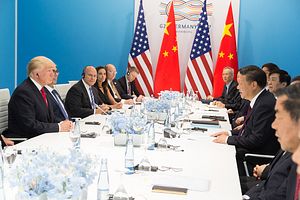World politics throughout history can be very dramatic. When Japan’s commercial and industrial consortiums marched into the U.S. market and significantly challenged U.S. economic dominance several decades ago, Time magazine exclaimed that “the issue — and the real Japanese challenge — is nothing less than whether the two mightiest trading nations in the world can learn to live in commercial peace.” In the end, no major war broke out between this pair of commercial rivals and close allies at the same time. What happened to the Japanese economy after the 1980s, however, may remind us that peace comes at a price, in one way or another.
Now, history seems to be repeating itself. After the United States and China called a truce in their trade war in early December 2018, these two economic giants finally ceased leveling tariffs upon each other. Although temporary, the truce is nevertheless great news and provides timely relief to China and the United States, both of which were growing exhausted in this strategic-level commercial dare.
Certain problems, disputes, and even the danger of future conflicts, however, are still lurking, particularly as the Trump administration has long since decided to end the previous status quo. According to a recent report from the Brookings Institution, the current U.S. government believes that “trajectory of the bilateral relationship favored China and disadvantaged the United States in a long-run competition.” Accordingly, report authors David Dollar, Ryan Hass, and Jeffrey A. Bader argue that “the Trump administration over the past two years has adopted an increasingly zero-sum, unilateralist, protectionist, and nativist ‘America first’ approach to the relationship.”
Therefore, a temporary agreement on the table is far from satisfying Washington (and Beijing as well). There probably will be psychological wrestling entangled with rounds of back-and-forth over many strategic, tactic, policy-level, and technical issues between Washington and Beijing.
Be it a trade war or a psychological war, and the point is that when the Trump administration decided to end the previous trajectory of the U.S. relationship with China especially in respect to trade issues, it did so almost like flipping a card – very quickly, and very decisively. However, great power relationship in contemporary world politics are more complicated than this. Dealing with the overall Sino-U.S. relationship is not like flipping a card in a game – where one side says peace, and the other side says (trade) war. It is simply too heavy and too costly to flip the card, given the sheer sizes of both countries and the significant consequences that may follow.
In any circumstance, China and the United States should work together, put their cards on the table, and make sure that the side which says “peace” is always on top. This is the paramount and destined mission for great powers. In the long run, a sustainable and peaceful economic environment on the basis of mutual trust and respect is essential not only to China’s further opening and reform (which of course serves America’s interests in the Chinese market) but also to America’s economic growth and prosperity at home.
At the end of the day, as the two leading economic powers that share many interests with each other, China and the United States are not destined for war, but for cooperative and sustainable peace.

































